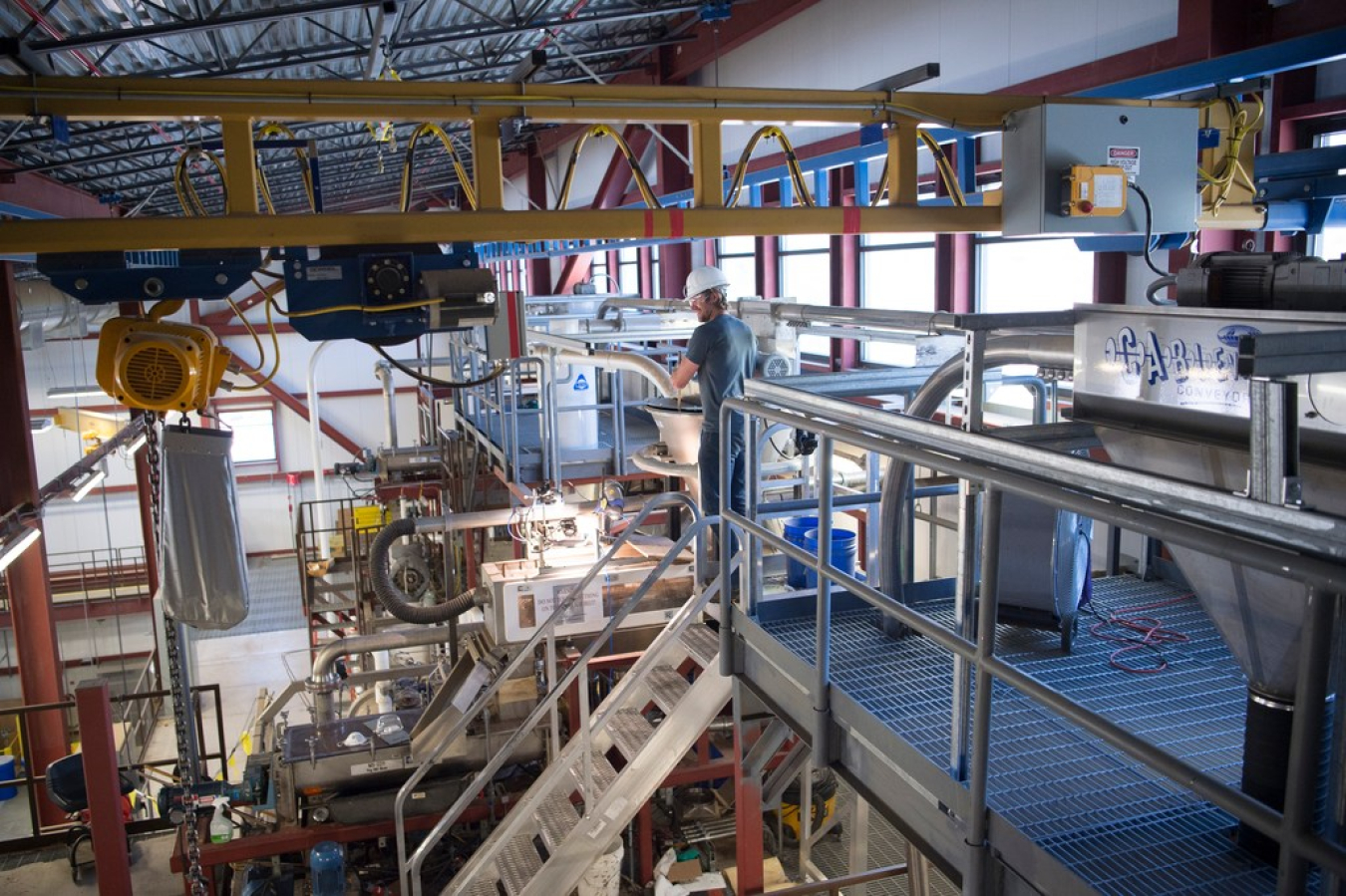
A researcher loads feedstock into reactors at the National Renewable Energy Laboratory (NREL) Integrated Biorefinery Research Facility. Photo by Dennis Schroeder, NREL
The U.S. Department of Energy (DOE) Bioenergy Technologies Office (BETO) is overseeing a call for industry partnerships to connect industry stakeholders with the capabilities of the Feedstock-Conversion Interface Consortium (FCIC). This funding opportunity will provide resources that allow partners to collaborate with FCIC researchers to address the cost and risk impacts of feedstock and process variability across the bioenergy and bioproducts value chain.
Research areas may include biomass supply, handling, transport, storage, preprocessing, and initial conversion. To maximize the likelihood of near-term impact for industrial partners, the FCIC seeks to fund projects that leverage existing capabilities within the consortium rather than projects that require the development of new capabilities.
The FCIC Industry Partnership Call will contain the following three Topic Areas:
- Topic Area 1 – Cooperative Research and Development Agreement (CRADA) Partnerships
CRADA partnerships are intended to partner an industry stakeholder with one or more FCIC partner national laboratories. The CRADA will identify background intellectual property (IP) for all involved parties and will protect any IP developed during the project. Project areas may include feedstock supply, handling, transport, storage, preprocessing, or initial conversion to target bioproducts. This Topic Area will require the applicant to commit a minimum of 20% cost share to the project, which can include in-kind or cash. The minimum DOE funding for a proposed project within this topic will be $400,000, with a maximum funding of $2 million. Total estimated DOE funding for this topic will be $3 million, and projects are targeted to last up to 36 months.
- Topic Area 2 – Rapid Technical Assistance
Technical assistance projects are intended to provide rapid technical assistance to an industry stakeholder from one FCIC partner national laboratory utilizing their unique capabilities. Projects will not generate IP, and therefore, neither a CRADA nor cost share is required. The minimum DOE funding for a proposed project within this topic will be $50,000, with a maximum funding of $150,000. The total estimated DOE funding for this topic will be $500,000, and projects are targeted to launch quickly and last up to six months.
- Topic Area 3 – Biorefinery Technical Assistance
Topic Area 3 focuses on supporting current pilot, demonstration, or commercial-scale biorefineries with process design or operational troubleshooting support from one or more FCIC partner national laboratories. The technical assistance projects are targeted toward larger-scale biorefineries, either in the planning, design, or operating phase. Projects are intended to partner an industry stakeholder with one or more FCIC partner national laboratories for technical assistance, using the national laboratory’s unique capabilities and expertise while not generating IP. Therefore, a CRADA is not required. It is anticipated that the applicant would provide substantial involvement and commit a minimum of 50% in-kind cost share to the project. The minimum DOE funding for a proposed project within this topic will be $200,000, with a maximum funding of $750,000. The total estimated DOE funding for this topic will be $1.5 million, and projects are targeted to last up to 24 months.
| Topic Area | Maximum Duration (months) | Total Federal Share Per Project | Minimum Cost Share | CRADA Required? |
Topic Area 1: CRADA Partnerships
| 36 | $400K–$2M | 20% (in-kind or cash) | Yes |
Topic Area 2: Rapid Technical Assistance
| 6 | $50K–$150K | None | No |
Topic Area 3: Biorefinery Technical Assistance | 24 | $200K–$750K | 50% (in-kind) | No |
Proposals should clearly identify how the work addresses an aspect of BETO’s goals to 1) decarbonize the transportation sector by producing cost-effective and sustainable aviation fuel and other strategic liquid and gaseous fuels, 2) decarbonize the industrial sector by producing cost-effective and sustainable bioproducts, and 3) decarbonize the agricultural sector and other carbon drawdown technologies. All DOE funding will go directly to the national laboratories to execute the projects.
The deadline to submit an intent to propose a project is November 1, 2024, and final proposals are due December 6, 2024. Learn more about the industry partnership call and how to apply on the FCIC FY25 Industry Partnership Call webpage or contact [email protected] if you have further questions.
FCIC FY25 Industry Partnership Call Informational Webinar
Register for an informational webinar on September 16, 2024, from 1 p.m. to 2 p.m. ET, to learn more about this Industry Partnership Call, the application process, and FCIC capabilities. The webinar is free and open to the public.
Learn more about FCIC and visit BETO Funding Opportunities for other upcoming funding opportunities.

